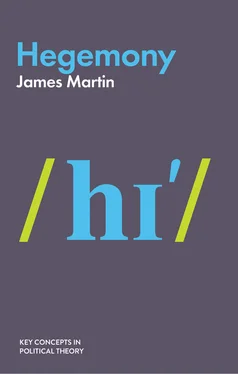Our focus, then, might sometimes be the group that benefits from this leadership. But it also might be on the ways other groups and practices come to be led. Some of the most inventive uses of hegemony have been by scholars of cultural studies such as Raymond Williams or Stuart Hall, for whom popular experiences of ‘everyday life’, ‘culture’, or ‘common sense’ (as Gramsci called it) were the locus for ongoing negotiations with dominant social forces. Hegemony, in their analyses, encourages us to ask how seemingly disparate forms of cultural activity – such as writing, cinema, or music – are implicated in contests to determine what it is that society holds in common.
The question of subjectivity is, however, controversial. It requires that we account for how symbols function, how they become activated and deployed (when, and by what mechanisms?), and how they contribute to the persistence (or not) of particular structures of domination. How does ideology or culture relate to social interests (which are assumed to be more or less fixed)? Indeed, what are the limits of this feature of leadership? Hegemony implies that domination is not easily demarcated around one discrete agent but, rather, subtly entangled in the subjectivity of ordinary people via language or forms of cultural attachment. That makes it difficult to identify a single ‘owner’ of ideas or benefactor of power. The complex relation of subjects to forms of violence and coercion is also pertinent here since hegemony rejects exclusive attention to coercion in favour of consent. Yet violence is frequently a feature of struggles over hegemonic leadership – especially when some groups resist it – and sometimes a sign of its internal fracturing. Social crises, when alliances splinter and once-shared values fall into open dispute, may express the subjective symptoms of hegemonic decline.
Ethics – uniting leaders and led
Finally, hegemony implies an ethical relationship that governs the interactions between leading groups and their key allies and supporters.
Most uses of hegemony are focused on analysing strategic features of domination. They tend not to be overtly ‘normative’ or deal with moral questions. Indeed, theorists of hegemony are usually moral ‘realists’ in that respect, treating normative issues as inseparable from practical problems posed by empirical reality. Nonetheless, leadership usually involves expressing common ideals as well as internally organizing and regulating how different groups and interests relate through them. Priority might be given to certain types of association – class solidarity, national identity, democratic respect – that connect hegemony’s politics to an ethic that assists the integration of its various parts.
Hegemonic strategies raise questions about how leaders enact their responsibility to the forces that sustain them. What kinds of elites rule, and from where do they originate? How is popular experience incorporated into the ways they lead? What relationship do supporting groups have with each other? The ethical dimension of hegemony is particularly relevant to those who wish to substitute domination with an alternative, ‘democratic’ or ‘liberated’, order. But it is not always examined closely, possibly because normative commitments are frequently presupposed as given. The question of what ethical terms organize hegemony is, however, a lively issue when old solidarities and modes of participation can no longer be taken for granted. Of note here is the question of the extent to which strategies of hegemony are compatible with pluralistic, democratic ideals.
Hegemony is a powerful concept because it condenses into one term a variety of complex phenomena. It is probably wise, then, to think of it not simply as a concept in the abstract but as the name for a general framework for examining the interaction of these different dimensions. Doing so can help us to draw attention to the different accents and emphases that have characterized its use.
The following chapters explore five themes that, in broadly chronological order, have defined new formulations and applications of, or debates about, hegemony. Each chapter deals with a distinct framing of arguments and issues in the evolution of the concept. But the themes are also topics that extend across time and serve as the preferred frame for readers to think about hegemony. So the chapters can be read sequentially or, if preferred, according to the theme that interests you most.
Chapter 2begins with the seminal work of Antonio Gramsci, who supplied the basic coordinates for many contemporary reflections on hegemony. For him, it was a concept that helped to elaborate a distinctive strategy for revolution in developed capitalist states. That strategy was conceived as a process of consensual state-building rather than a Bolshevik-style, violent seizure of power. It meant gradually extending the cultural and political bases of support for an emergent ruling class. In Gramsci’s work, hegemony expands into a whole framework of analysis for understanding the origins, techniques, and limits of class domination.
In chapter 3, our focus is on Marxist debates over how to apply hegemony to the analysis of the postwar capitalist state. Unlike Gramsci, who wrote during a period of political instability, thinkers in the 1960s and 1970s utilized hegemony to understand the evolution of relatively stable ‘welfare’ states. Hegemony helped to focus on the political integrity of national capitalisms, but also on their changing cultural foundations and sites of ideological tension. Marxist theories of the capitalist state and the emergent discipline of cultural studies each made important contributions to the development of the concept in this period. Their analyses were crucial for understanding efforts to rebuild social bases of consent, such as the phenomenon of ‘Thatcherism’ in the 1980s and, more recently, forms of right-wing ‘populism’.
‘Post-Marxist’ approaches to hegemony are the theme of chapter 4. The project of ‘radical democracy’ initiated by Ernesto Laclau and Chantal Mouffe involved a major theoretical reconstruction of hegemony as a framework of analysis and a strategy for emancipation. The obsolescence, as they saw it, of Marxist appeals to economic ‘determination’ and to the political primacy of class demanded new ways to theorize radical politics. Coming near the end of the Cold War and just in advance of the collapse of South African Apartheid, Post-Marxism and radical democracy looked forward, presciently, to a non-revolutionary, pluralist politics of social movements. In Post-Marxist approaches, hegemony became more theoretical but also more mobile, exploring diverse forms of power and domination, numerous different ‘discourses’, and political contests.
In chapter 5, we consider the application of hegemony to the study of international politics. Hegemony has a different lineage here. In theories of International Relations, it has been widely used by so-called ‘realist’ scholars to explain the leading role of a dominant world power in a system of states. That approach was challenged by radical critics – notably, Robert W. Cox – who drew on Gramsci’s insights to reconnect international politics to class struggles within world capitalism. Neo-Gramscian scholars of International Political Economy have subsequently explored the historical, political, and ideological dimensions of international hegemony. They have contributed to the analysis and critique of ‘globalization’, understood as an expansion of ‘neo-liberal’ capitalism.
Finally, chapter 6turns its attention to critiques of hegemony by recent political theorists. Despite regular reinvention, hegemony is tied to a view of political power as something to be identified, challenged, and remade. For a number of critics, however, the language of hegemony – particularly its preoccupation with strategies that unify people and join them in a common project – remains a project of mastery. Indeed, it is argued – on the basis of radically different ‘ontological’ grounds – that hegemony cannot appreciate the dynamic nature of power and the ‘spontaneous’, ‘autonomous,’ and creative forms of resistance to it. A genuinely radical politics, it is proposed by various ‘new materialists’ and anarchists, demands not the reinvention but the end of hegemony.
Читать дальше












